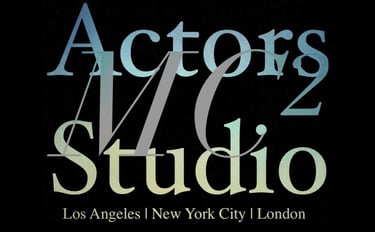Public Solitude


Public Solitude
by Mario A. Campanaro
Let's talk about public solitude.
Constantin Stanislavski once said,
“In a circle of light on the stage, in the midst of darkness, you have the sensation of being entirely alone. This is called solitude in public… During a performance, before an audience of thousands, you can always enclose yourself in this circle, like a snail in its shell. You carry it with you wherever you go.”
The actor must understand the human condition outside of their comfort zone and be able to execute action while maintaining immense, uninterrupted focus and concentration in order to live freely and truthfully from moment to moment. In other words, acting is not for the faint of heart.
The actor generously offers themselves to live a myriad of high-stakes circumstances vastly different from their everyday life, and then does so in the unnatural environment of an audience—whether in theater, film, or TV. It is within this “audience environment” that the actor is called to live their most private essence publicly, as it pertains to the specific text or story. The actor must build and sustain faith in the entirety of those given circumstances, living them moment to moment, taking action to overcome obstacles in order to pursue the needs that drive the story forward.
Though the actor longs to be in that beautifully rich, alive, highly focused, instinctual, and truthful creative state, it is not always readily available. Internal and external distractions can, and often do, emerge, preventing the actor from accessing that free, creative state. Therefore, the actor must work with great discipline and intent to develop and maintain the muscle that keeps them in that concentrated and truthful state of being, both in the space and in front of the audience.
The actor must understand and have the ability to control their instrument (mind, body, and voice) without the physical, mental, psychological, or emotional tensions that can trap them, preventing them from remaining in that free and truthful state.
The actor cannot wait for an audition or job to be able to do this. As a professional, the actor must have this muscle ready and available at all times, whether in an audition or on the actual job. The professional is consistent; the amateur depends on luck. The actor can convince themselves of every excuse in the world as to why it’s not happening, but at the end of the day, it’s the actor’s job to make it happen and to do the work.
Unnecessary physical, mental, psychological, and emotional tensions often take hold when the actor steps on stage, in front of the camera, or before any specific audience. These tensions interfere with the actor’s ability to live freely and truthfully moment to moment, while also interrupting their focus, concentration, and faith in the world they are living in circumstantially. These tensions can easily create physical paralysis, intrusive mental chatter, self-consciousness, inner critique, pushing, overworking, lack of listening, constriction, emotional and behavioral untruths, and a cascade of distractions.
The simplest of tasks or actions—ones that do not require much energy in everyday life—suddenly become over-energized "performances" when the actor is in front of an audience, dissolving all basic and simple behavioral truths. The ability to take action with the truthful energy and focus that a specific task demands is lost. Because of these tensions—or even a lack of skill—the actor may lose the ability to execute even the simplest human truths and behaviors once stepping in front of an audience. If the actor struggles with these tensions, executing more difficult objectives, which require more energy due to the high circumstantial demands of the text, will be even harder.
The actor, whether they want to admit it or not, can often become imprisoned by a preoccupation with the audience, leading to physical, mental, emotional, and psychological constriction, and an overall lack of freedom, devotion, concentration, and focus. The actor’s attention must not be directed toward the eyes and ears of those witnessing their performance but must be focused on all the givens of their life within the story itself. The actor must particularize everything to such a degree that it becomes so engaging that it captures and maintains all their attention, focus, and concentration.
The actor will always be aware that there is an audience, but their skill must help them maintain an expansive yet focused circle of concentration, preventing the audience from imposing upon them. Within this circle, the skilled actor has the ability to expand or narrow what enters their mind, body, and spirit. A skilled actor controls and chooses what captures and keeps their concentration and attention. Where that skill falters, it becomes something to habitually work on.
This is why we work on "public solitude" and "private moment." It is a narrow circle of concentration that allows the actor to shrink or expand where their focus resides according to the demands of the stage action or circumstances. This circle creates full communion and maximum faith in one’s life and expression on stage or screen, while also providing immunity to outside distractions. The actor must trust that where their attention and concentration live, the audience’s attention and concentration will follow. Where the actor lives, the audience will live and experience.
Therefore, the actor’s work demands complete inner and physical concentration, whether their circle of concentration is narrow or expansive. This includes all the actor’s internal and external senses—sight, hearing, feeling, tasting, smelling. It should all work together to ignite and inspire the actor’s instrument—mind, body, and spirit—allowing for the necessary concentration and focus to live the circumstances moment to moment, while stimulating their imagination, instincts, impulses, feelings, psychology, emotions, and behavior in relation to the text.
The actor must work with great intent to live privately in a public way while on stage. The actor must confront where their shyness, self-consciousness, inner critic, self-judgment, resistance, and inhibitions reside—preventing them from doing what they aim to do artistically and professionally. This will inevitably bring up a lot… but it requires letting go… letting go of all the masks we hide behind, and simply be. When the acting is no longer acting. When we see a human being living moment to unknown moment.
Copyright © 2025 Mario A. Campanaro, All rights reserved."


